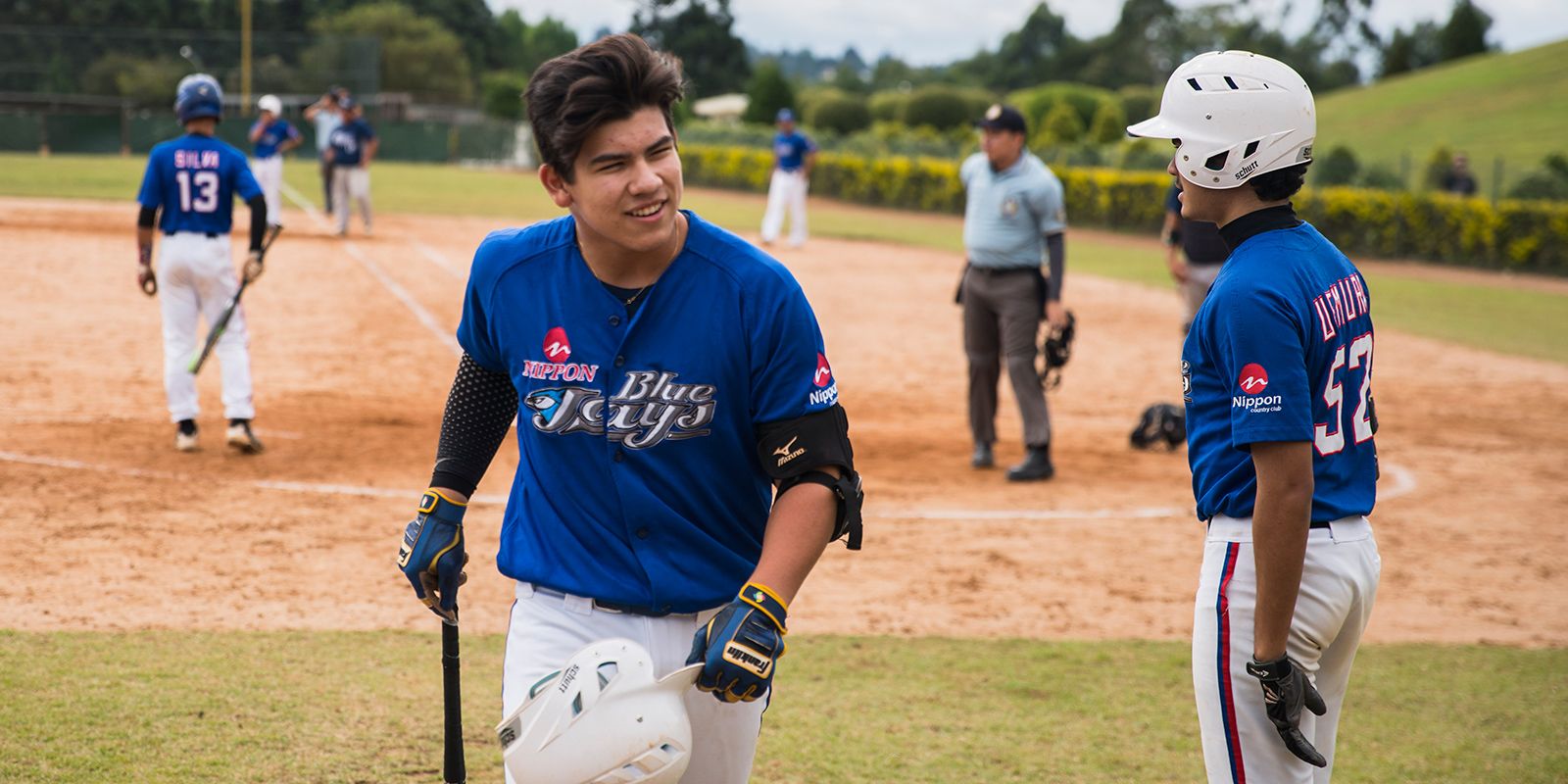
Meet Brazil's Most Valuable Arm
When MLB's international signing period opened July 2, Eric Pardinho collected an eye-popping seven-figure payday. Can the 16-year-old pitcher live up to his father's sales pitch?
Editor's Note: This story originally ran on June 2, 2017 and has been selected by ESPN.com's MLB editorial staff as one of our best stories of 2017. This story is also posted in Spanish and Portuguese.
In the rolling hills of Ibiuna, high above the eucalyptus trees and about 50 miles west of downtown Sao Paulo, a major league scout stands behind home plate at the Yakult Academy stadium on a Sunday afternoon in April. From the darkness of the official scorer's booth, he points a radar gun at the mound, where 16-year-old right-hander Eric Pardinho is blowing away overmatched adolescents who have no earthly business stepping into the box against him.
Nearby, another evaluator raves about the young hurler's textbook technique. About how he rotates the lower half of his body to create leverage that someone who's generously listed at 5-foot-10 shouldn't be able to create. How his hands are in perfect position when his front foot strikes the ground. And that follow-through. "You sign guys and work with them for three years in the minor leagues to get them to do all that," the scout says.
Last September, as a 15-year-old, Pardinho triggered a sensation when he served up mid-90s cheese to grown men at the World Baseball Classic qualifier in New York City. Nearly a year later, with MLB's international signing period set to begin on July 2, he's expected to ink the richest deal ever given to a prospect from his country.
But not everyone is sold. Some MLB executives wonder about the kid's size and the lack of competition in Brazil, a soccer-crazed country that didn't produce its first big leaguer until 2012 and has sent a grand total of three players to the majors.
So is he worth it? The answer lies in the pitch -- the sales pitch, that is.
Up in the stands along the first-base line, Pardinho's father, Evandro, looks on intently. On Friday, as he often does, he drove 300 miles to watch his boy compete in a weekend tournament. On Saturday, he damn near had a heart attack when his kid tried to score all the way from second on a wild pitch, sliding into home on a bang-bang play in which the late-arriving pitcher had to hurdle over Pardinho, narrowly avoiding a gruesome collision. Now it's Sunday, and even though it's the championship game, the new face of Brazilian baseball is on a pitch count. Instead of the normal five or six frames Pardinho would typically work, he'll throw just two innings.
For what it's worth, his father -- whose relentless pursuit of getting his son to the majors resulted in Eric becoming the first Brazilian prospect ever to have an agent -- is on board with the kid-gloves approach.
"My biggest fear is that he gets hurt," Evandro says. "I want to put him in a bubble."
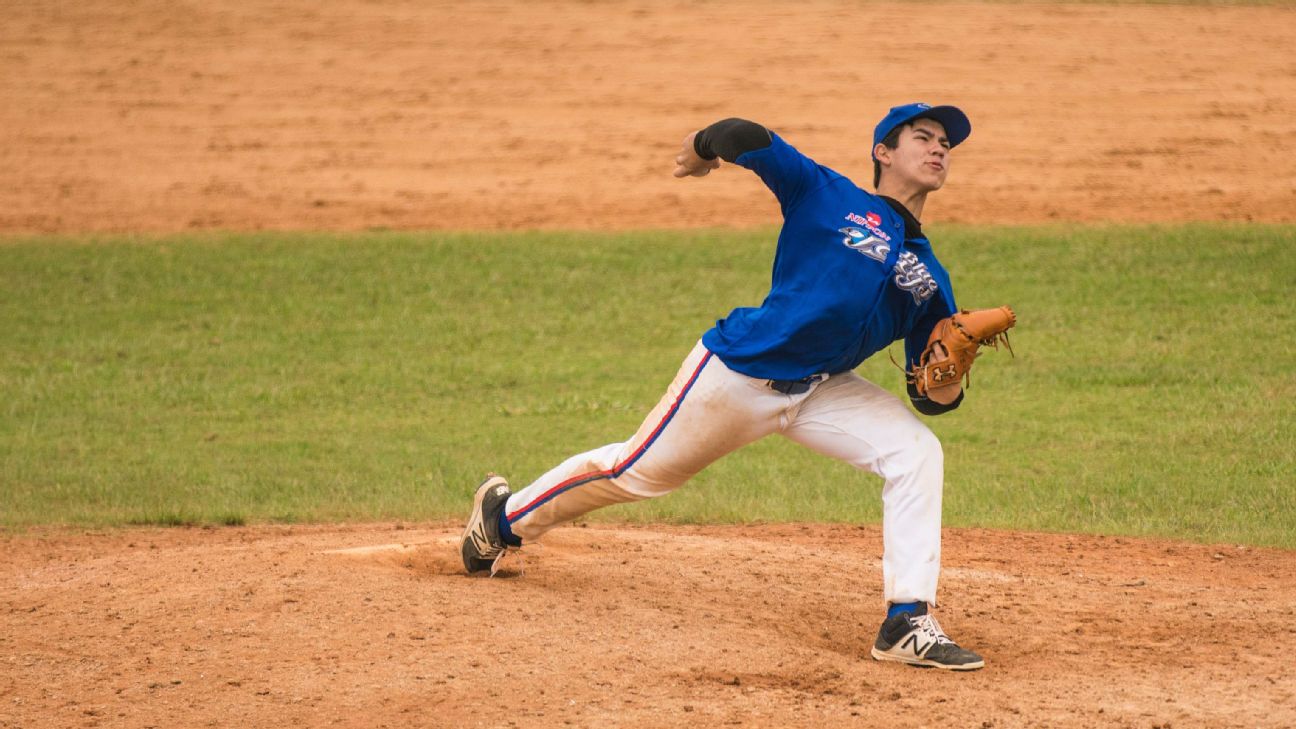
In a soccer-crazed nation, baseball has been an afterthought in Brazil, but that might change with pitching prospect Eric Pardinho.Luiz Maximiano for ESPN
Evandro Pardinho is a salesman. The great-grandson of Italian immigrants, he wears designer glasses and designer button-down shirts. He has perfectly coiffed salt-and-pepper hair and shiny manicured fingernails. He makes his living peddling children's footwear for a Brazilian company called Kidy.
But one of Evandro's most successful sales pitches ever was to his 6-year-old son.
It was 2007, and the Pardinhos had just gotten back from a beach vacation in Parana, where Eric's Japanese uncle had been impressed with the hand-eye coordination his nephew showed playing paddleball one morning. Maybe he should give baseball a try, the uncle told his brother-in-law.
Back at home in the rural town of Bastos, knowing full well Eric would resist, Evandro sold his son a bill of goods. He said he was taking him to play soccer, the child's first love. Instead, Evandro drove Eric straight to the local diamond for a blind date with baseball.
"I didn't know what it was," Eric says. "But there were a lot of kids playing it, and I was curious. Kids like dirt and balls, so I had a lot of fun."
Still, the best part of the day came once the bats and gloves -- and the pushy parents -- went away.
"Afterwards, we all stuck around and played soccer."
A decade later, the shoe salesman admits he had to work overtime when it came to hawking hardball to his son.
"At first, there was resistance because he was in love with soccer," says Evandro, a former volleyball player who learned the American pastime alongside his son, even volunteering to coach Eric's youth team despite his lack of familiarity with the sport. "But with a lot of insisting, he ended up giving in and started going to baseball practice."
For a father who knew absolutely nothing about the grand old game, getting his boy to buy into baseball might seem like an odd agenda -- until you consider the fabric of the farmland that surrounds him.
Like many Asian immigrant colonies in Brazil, which boasts the largest Japanese population in the world outside of Japan, Bastos remains indelibly influenced by its ancestry. The main street is called Avenida Dezoito de Junho (June 18th Avenue), named after the date in 1908 when migrant Japanese farmers arrived in Brazil and burrowed their way inland, looking for work in the coffee and sugarcane fields. One block over is a community center where elderly women dressed in kimonos practice traditional dance and young students learn to complete seemingly impossible mathematical equations in a matter of seconds using an ancient abacus called a soroban.
But perhaps the single-most Japanese thing about the place is its baseball field.
Officially named for the man who founded Bastos nearly 90 years ago, Tsutoma Maruyama Baseball Stadium has been around as long as the town has and is situated right in the middle of it, next to the church. Known to locals as Campo de Cidade (City Field), it was a temple built by the Japanese in honor of the game they love. For most of the 20th century, that's pretty much who used it, partly because of an insular immigrant community that wasn't interested in mingling with gaijins (outsiders) and partly because most of those gaijins preferred soccer to the import sport with the weird rules. But starting in the 1980s, when the nation's economic crisis sent many Japanese immigrants back across the Pacific, the DNA of Brazilian baseball slowly started to evolve.
In 1992, Jose Pett, a blond-haired, blue-eyed, 6-foot-6 specimen from Sao Paulo, signed with the Toronto Blue Jays for $700,000, more than any international player had ever received. In 2000, when the Yakult Academy opened in Ibiuna, six of the 25 baseball players in its first class were full-blooded brasileiros.
By the time Eric Eiji Tanaguchi Pardinho got snookered into visiting City Field a few years later, the gaijin revolution was well underway.
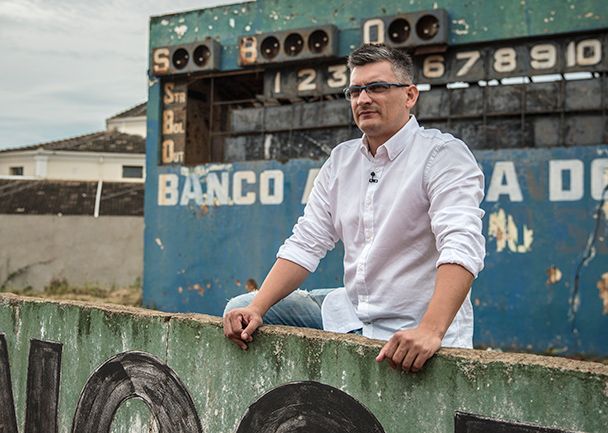
Evandro Pardinho is a salesman, and one of his most successful pitches ever was his son. Luiz Maximiano for ESPN
Maybe it's just a coincidence that in 2013, the year after fellow Bastos native Luiz Gohara signed a record-breaking deal with the Seattle Mariners worth nearly $1 million, Evandro Pardinho's 12-year-old son finally gave up soccer and started focusing on baseball. Then again, salesmen do work on commission.
The year after that, in 2014, Evandro sent his son to live on his own at the Yakult Academy, where Gohara had once trained and where Eric became the youngest resident at what is essentially Brazilian baseball's answer to the IMG Academy. Besides packing his glove and cleats, Eric brought along a daunting to-do list.
"For Eric to achieve the success he's building in Brazil and the world, we had to create goals for him," says Evandro, noting that when his son arrived at the academy, his fastball was maxing out in the low 70s -- good for a 13-year-old, but not good enough. "We had a goal that in a year he would reach 80 miles an hour. He managed to reach 80 at age 14, and when he turned 15, the goal was to reach 90 miles an hour. It was a huge step from 80 to 90 in a year, and after 90 he created other goals, to reach 92, 94, until he reached 95."
It was such a drastic jump in velocity -- especially for a kid who's on the wrong side of 6 feet -- that those who know Eric are concerned about whether his body can handle it.
"It worries me a lot," says Mitsuyoshi Sato, a gentle 69-year-old who has served as the head coach at the Yakult Academy since it opened and answers exclusively to the nickname Sensei. "This is a rare thing in the world of baseball. So we take special care to avoid injury, especially in his arm. We're happy, but at the same time we're worried about it. How can this boy throw so fast?"
The secret, at least in part, can be found in Eric's Asian-influenced instruction.
"We used the Japanese technique on him," says Arthur Asanome, who has spent the past 30 years coaching kids in Bastos, including Gohara, who was traded to the Atlanta Braves in January. Unlike Gohara, a burly 6-3 lefty who draws comparisons to CC Sabathia, Pardinho doesn't have great size. But what he lacks in magnitude, he makes up for with mechanics.
"The potential and union of all forces," says Asanome, referring to the Japanese emphasis on kinetic energy and weight transfer. "In very little time, he managed to assimilate all the teaching and began using his body the right way. He built mass, precision and velocity."
He also built a pretty solid résumé.
As a 14-year-old, Pardinho took the mound three times at the U14 Pan-American Championships in Venezuela and took home three trophies (for most wins, most strikeouts and lowest ERA). Last summer at the 2016 U16 Pan-Am Championships, he tallied 12 K's in six innings to lead Brazil over the Dominican Republic.
Two months later at the WBC qualifier in Brooklyn, he had his coming-out party, working two-thirds of an inning against Pakistan and flashing a fastball that was clocked at 94 mph. It wasn't a perfect outing by any means -- he walked a batter, allowed a hit and didn't finish the frame -- but for a 15-year-old from a country that's just starting to penetrate the collective consciousness of the scouting world, it was more than enough. Pardinho found himself at the center of a feeding frenzy.
The Mariners, Blue Jays and Arizona Diamondbacks showed interest. So too did the New York Mets, Cincinnati Reds and Tampa Bay Rays. The attention was so great that in January, the shoe salesman from City Field hired an athlete salesman from the City of Angels (agent Rafa Nieves, now of L.A.-based Wasserman) to handle Eric's negotiations. Shortly thereafter, father and son embarked on a whirlwind tour of showcases and medical exams and steak dinners. There was a locker with Pardinho's name above it and his trademark No. 43 jersey hanging in it, and grass so perfectly emerald that Evandro had to touch it to make sure it was real.
More recently, Eric was ranked by MLB.com as its No. 5 international prospect and the only pitcher to crack the top 25. When the international signing period kicks off, he's expected to ink a day-one deal for somewhere between $1 million and $2 million, well above the $880,000 that Luiz Gohara received five years ago.
In baseball terms, a million and a half bucks for an international talent might not seem like a whole lot -- not compared to the $42 million Cuban outfielder Yasiel Puig received from the Dodgers in 2012, or the $31.5 million Puig's countryman Yoan Moncada got from the Red Sox in 2015. Or even the $6 million the Giants gave Bahamian shortstop Lucius Fox that same year, a record for a non-Cuban player.
That said, Pardinho's expected haul is unheard of for a Brazilian prospect. Making the payday even more conspicuous is the new collective bargaining agreement that went into effect last December, which limits how much MLB clubs can spend on international signings by imposing a hard cap between $4.75 million and $5.75 million. (In the old labor deal, teams could spend as they pleased, just as long as they paid a luxury tax for going over their allotted amount.) In other words, relatively speaking, a million and a half bucks is a shipload of shekels.
"We just can't compete with that kind of obscene money, and there's no reason we should," says one American League executive who equates Pardinho's talent level to that of a third-to-fifth-round high school pick in the U.S., the kind that would typically sign for anywhere from $500,000 to $800,000. "You can get the same player in the States with way less downside. You don't have to pay for an interpreter, you know who he's played against and you've been able to evaluate him against good competition."
Says a second AL exec: "You can get pitching a lot cheaper in the Dominican and Venezuela."
Which raises the question: Why all the fuss over the kid from Bastos?
Unlike Gohara or any Brazilian prospect before him, Pardinho has an agent. Two agents, if you count his pops. "His people did a good job of promoting him," the second exec says. "If Gohara had done the whole showcase circuit and all that, he would've gotten paid a lot more."
Instead, it's Pardinho who's poised to make history. And plenty of money.
His dad seems just fine with both.
"People kept telling me that Eric was only good here in Brazil but that internationally there were millions like him," says Evandro, perpetually in sell mode. "I've always been an athlete and always wanted to be the best in everything I did. So it became a goal for me, and for him. We worked and talked so he could show the world that yes, Brazil can also have great baseball players. In July, when he can sign with an American team, we'll finish a story that started when he was 6. We'll close this chapter and open another chapter -- getting to the major leagues."
Baseball in Brazil remains heavily influenced by Asian ancestry, as seen by the characters on a field roller in Sao Paulo. Luiz Maximiano for ESPN
Back in the rolling hills of Ibiuna, high above the eucalyptus trees, the scout stands in the darkness of the scorer's booth with his radar gun trained on the pitcher's mound.
Even though it's the finals of the all-important Mariners Cup, Pardinho isn't starting or throwing his usual 70 or 75 pitches. Today he's a reliever, limited to about 30 bullets. July 2 is just around the corner and, well, better safe than sorry.
Earlier in the week, during an intrasquad scrimmage at the academy, Pardinho didn't participate because of a sore shoulder. But five days later, with radar guns and international eyes on him, he enters in the sixth inning of the championship game with his Nippon Blue Jays trailing 6-0 to Marilia, the powerhouse program that won it all last year.
"The only two at-bats I care about are Watanabe and Coutinho," says one of the scouts, implying that Pardinho being a man among boys has no predictive value whatsoever. Shoving against two prospects that might actually sign with MLB teams, however, is a different story.
In the sixth inning, Pardinho strikes out Vitor Watanabe, a short and wiry Japanese kid who's among the top players in the country. After whiffing Watanabe, he delivers a 93 mph heater to Victor Coutinho, a tall, broad-shouldered, olive-skinned lefty with a dark brown mohawk who is pretty much the poster child for the gaijin revolution. Coutinho -- who's arguably the best amateur hitter Brazil has to offer -- turns on the Pardinho offering and clobbers it to dead center, where the ball would have cleared the fence if not for the park's cavernous dimensions. Instead, it lands over the center fielder's head, about 400 feet away, for a stand-up double. The thunderous crack of Coutinho's bat serves as a sobering reminder that for all the hype surrounding Pardinho, there are red flags.
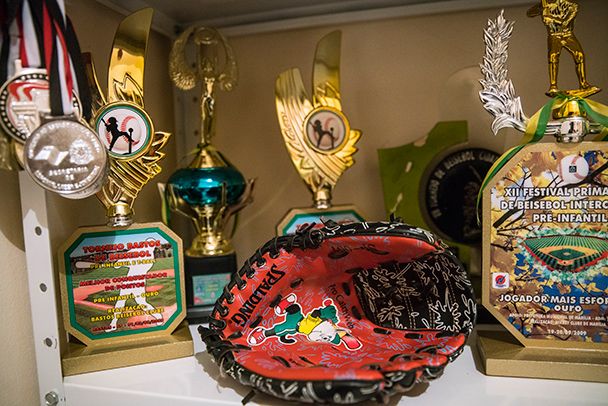
At just 16, Pardinho is poised to make history -- and somewhere in the $1-2 million range. Luiz Maximiano for ESPN
First there's the whole level-of-competition thing. While the influx of brasileiros has brought more athleticism to the game, the decline in Japanese players -- due to reverse migration and third- and fourth-generation families stressing education over sports -- has resulted in a bumpy brand of baseball. In the opening round of the Mariners Cup on Saturday, each of the first two games ends on a walk-off error. In Sunday's championship, the action is stopped for 10 minutes when a catcher accidentally clips his pitcher in the knee with a throw while attempting to gun down a runner stealing second.
"I'd like to say it's gotten better," says one American League scout of Brazilian baseball, "but for me it's slipped a little in the last few years."
Even though Pardinho is the exception, even though he typically does things right, there are concerns about what happens if he starts doing things wrong.
"Whenever I send a guy from Brazil to the U.S., I tell the front office that he's going to struggle," says a National League scout who grew up in Brazil, then pitched collegiately in the States. "Here, hitters who struggle the first time up are going to struggle the whole game because they don't make adjustments. In the U.S., the second time through the lineup is a whole different thing. When Pardinho gets to Double-A, he'll be just another guy throwing 95 with a curveball. He needs to get better, but what if he doesn't? What if he struggles so much that he doesn't want to play the game anymore?"
With that kind of acclimation process, it's easy to see why some insiders thought the Mariners and Diamondbacks might have the best odds to land Pardinho. Besides signing a combined five Brazilian prospects this decade, both clubs employ local Brazilian scouts. That's a rarity among MLB teams and something the Blue Jays, who are expected to sign Pardinho, don't do. That's not to say Toronto doesn't have any Brazilian connections.
Indians catcher Yan Gomes signed with the Blue Jays in 2009 and debuted with them three years later, becoming the first Brazilian-born player in the bigs (pitcher Andre Rienzo and outfielder Paulo Orlando have since followed). Long before that, back in 1992, the Jays were the first MLB team to test the Brazilian market when they landed Jose Pett, the gargantuan gaijin. The news was such a big deal in Pett's homeland that his club team changed identities and became the Nippon Blue Jays, complete with authentic unis that Toronto donated upon Pett's request.
A quarter-century later, Eric Pardinho wears that same uniform and is poised to follow in Pett's footsteps. Well, some of them, anyway.
As promising as Pett was, he was essentially out of baseball by the time he turned 22, the victim of a trying transition made even tougher by alcohol abuse, according to those who know his story. "He had all the physical tools," says one longtime scout, "but above the shoulders, it was a different story."
In stark contrast, the vertically challenged Pardinho -- who somehow managed to maintain composure on the WBC stage -- gets raves for his mental makeup. "Off the charts," the AL scout says.
"A lot of the guys on the national team get nervous, but I don't worry," says Pardinho, who's cocky enough that he wears an earring and takes on-deck swings with his helmet sitting next to him on the ground, leaving his black boy-band locks exposed for all to see. "I play those games like they're any other games here in Brazil."
He does confess to having felt a bit jittery in Brooklyn last fall. "The classic was different -- I did feel a little nervous at first. But I got used to it."
Just like evaluators have gotten used to his intangibles.
"His knowledge of baseball, his desire to succeed, that's the great equalizer," the scout says. "That's where you add the 2 inches to his height."
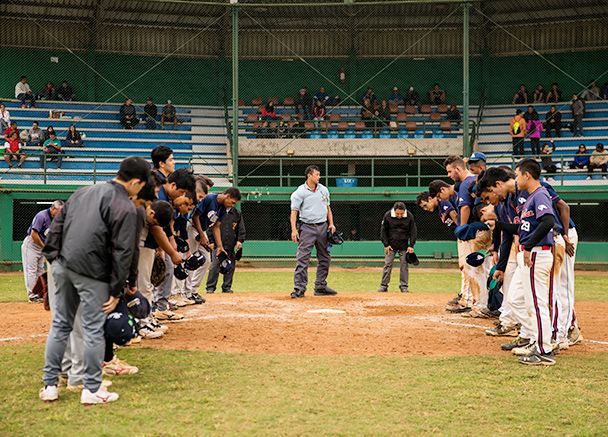
"We used the Japanese technique on him," says Arthur Asanome, who has spent the past 30 years coaching kids in Bastos. Luiz Maximiano for ESPN
Immediately after the finals of the Mariners Cup, both teams stand shoulder-to-shoulder on opposite foul lines, facing the diamond with their caps off. In unison, they bow and say arigato to the deserted field. Then they turn around to their coaches, bow again and thank them. Finally, they walk right up to the stands in between the two dugouts and repeat the gesture once more toward the crowd.
Despite its ongoing face-lift -- exactly half the players in the championship game are gaijins -- Brazilian baseball remains inextricably tied to its Asian origins. But the influx of non-Japanese players is helping put Brazil on the baseball map.
Gomes, Rienzo and Orlando are all brasileiros. Same goes for Gohara and Twins infield prospect Leonardo Reginatto, the two players most likely to break through next.
"In baseball," says one AL exec, "the athlete itself is what we're looking for."
And Brazil is where they're starting to look.
In 2007, the Mariners began sponsoring their eponymous tournament as a way of increasing brand awareness in Brazil. (Judging by Seattle's recent signings, it's working.) In 2011, Major League Baseball, ever intent on turning its product into the international pastime, began an informal partnership with the Yakult Academy, pouring six figures into the program annually in the form of equipment and coaching development.
The following year, under the guidance of manager and Hall of Famer Barry Larkin, Team Brazil went undefeated in its qualifying pool -- including a 1-0 victory over heavily favored host country Panama -- to advance to its first WBC. Even though Brazil failed to make it out of the Brooklyn qualifier, an electric cameo by a certain 15-year-old pitcher generated plenty of buzz.
Four months later, in January, Rob Manfred & Co. upped their ante in Ibiuna, officially partnering with the training center there to create the MLB Elite Developmental Academy Brazil. Right around then, Pardinho -- agent and all -- hit the showcase trail. Maybe the timing was a coincidence. Maybe it wasn't.
"MLB is betting on the Brazilian athletes market," Sato says.
Brazil's breakthrough is peanuts when you consider how immense the country is and that Venezuela, a nation nearly one-tenth the size of its neighbor, has produced just over 360 big leaguers to date. But you have to start somewhere. Colombia, another South American nation that borders Brazil, yielded just seven major leaguers in the 20th century but has supplied a dozen more in the past decade. Even though Venezuela has been producing players since 1939, more than a quarter of its big leaguers have arrived in the past five years alone.
There's clearly something to be said for momentum. Just ask Jorge Otsuka.
The day after the Mariners Cup championship, the president of the Brazilian Baseball and Softball Federation sits in his Sao Paulo office -- a tiny room on the second floor of an insurance agency he used to run before he retired -- and talks about the state of the sport he loves almost as much as his four grandchildren; about the challenges of growing a game that's gotten no love from the federal government because it hasn't been an Olympic sport (baseball was last seen at the 2008 Games in Beijing); about what a shame it is that in the entire country, there are only about 100 diamonds, not one of which has lights; about how even though there are more brasileiros than ever migrating to the game, the total number of federated players has dropped from 6,000 a couple of decades ago to 3,000 today, due to the Japanese exodus.
"We're a little worried," says Otsuka, the only president the federation has known in its 17-year history. "Because the technical side of Brazilian baseball has been increasing a lot, but the number of athletes is not increasing."
There's still plenty of reason to be optimistic. There's the partnership with MLB, an accord that's delivering much-needed coaching help. Baseball is slated to return to the Olympics in 2020, bringing with it the hope of increased governmental support. And the country's burgeoning big league pipeline has folks wondering whether Brazil can become baseball's next great frontier.
"I think it's going to continue to grow," says Paulo Orlando, the most recent Brazilian to reach the majors. "More brasileiros want to play baseball now. They want to sign. They want to have the chance to change life for their family." With one stroke of a ballpoint pen, Eric Pardinho will soon do just that.
"He's practically hired by Toronto, right?" Otsuka says. "Toronto Blue Jays."
It's a decidedly altered version of the future his parents once envisioned. "We thought he'd become a doctor," says Evandro, whose son will now be stopping school at age 16. "It's difficult -- but the contract will make it easier."
Adds Eric: "It'll be different. A new life and a new start."
Not just for him and his family but also for his country.
"He's very important for Brazilian baseball," Otsuka says. "But like most young athletes, he has to be careful not to let the success go to his head because ..."
Otsuka pauses, then resumes his train of thought.
"... Have you met his dad?"


